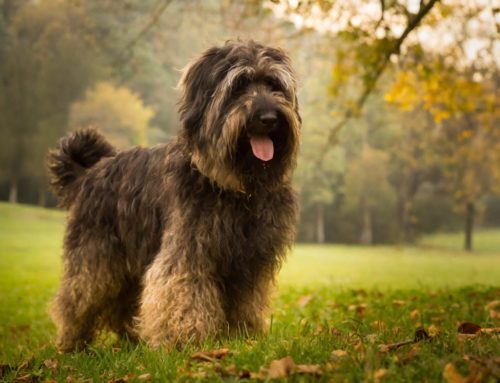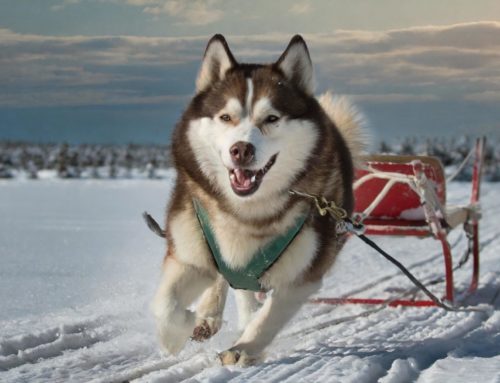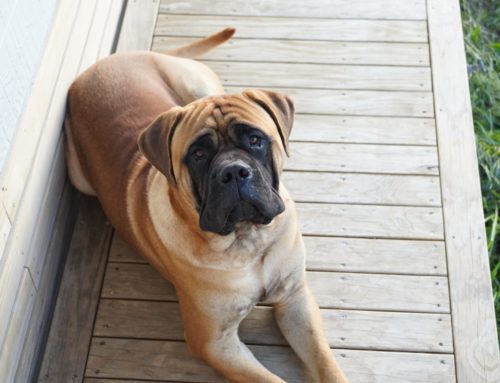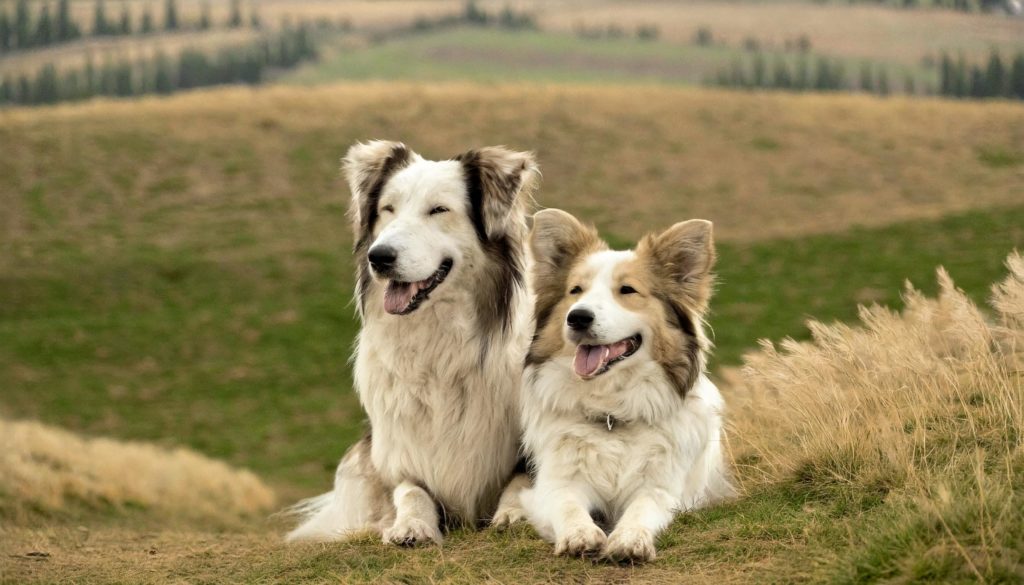
The history of the Atlas dog, also known as the Aidi or Atlas Sheepdog, has deep roots in Morocco, a country in North Africa. This breed has been a valuable companion and protector for the inhabitants of the Atlas Mountains for centuries.
The Atlas dog likely has its origins in the region and has evolved over the years into a strong and resilient breed that served as a versatile working partner for the locals. The breed is known for its robust build and endurance, making it suitable for a variety of tasks, such as guarding herds, protecting against predators and assisting hunters in hunting.
Along with the Sloughi, the only other internationally recognized Moroccan dog breed, the Atlas dog has a long history of service in Morocco. These dogs are smart, loyal and determined, and they often acted as guard dogs and protectors of households and livestock.
It was not until 1963 that the Atlas dog was internationally recognized by the Fédération Cynologique Internationale (FCI), which helped protect and promote the purity of the breed. Today, the Atlas dog is valued for its excellent character and is still used in hunting, guarding and as a loyal companion for those experienced in handling active dogs.
The appearance of an Aidi or Atlas dog
The Atlas dog is a medium-sized dog breed native to the Atlas Mountains in North Africa. With a life expectancy of as much as 6 to 14 years, the Aidi is an energetic and lively dog that needs plenty of exercise.
With a shoulder height between 52 and 62 cm and a muscular physique, the Aidi is ready for action. The Aidi’s appearance is striking. They have a thick, double coat that requires regular brushing, especially during shedding, which occurs about twice a year. This special care contributes to the dog’s health and well-being.
The breed has an elongated head and a long tail. The purity of the breed is carefully guarded by breeders and the Board of Management recognized breed association. The Aidi is known for its watchful nature and is often used in guarding herds.
Hereditary diseases and disorders.
As the only internationally recognized Moroccan shepherd dog, the Aidi or Atlas dog, like many dog breeds, has certain health problems of which breeders and owners should be aware.
Some hereditary diseases and disorders that can occur in the Aidi include:
- Hip dysplasia: This is a common problem in medium-sized dogs like the Aidi, where the hip joints are not well developed and can cause pain and movement problems.
- Elbow dysplasia: This is a condition where the elbow joints are not well formed and can cause lameness and pain.
- Eye problems: Aidis can be prone to various eye conditions, such as cataracts and progressive retinal atrophy.
- Stomach tilt: This is a serious condition in which the dog’s stomach can turn over, which is a life-threatening situation.
- Epilepsy: Some Aidis may be predisposed to epileptic seizures.
- Allergies: Like other dog breeds, Aidis can develop allergies to food or environmental factors.
- Heart problems: Heart disease can also occur in Aidis, so regular veterinary checkups are important.
The Character of the Atlas Dog
The Aidi is known for its unique character and traits. Originally from Morocco, this medium-sized dog has a number of distinctive characteristics that set it apart.
Its character is characterized by its energy and vigilance. This dog was traditionally bred as a herding dog and watchdog in the Moroccan Atlas Mountains, and this is reflected in its character. They are very watchful and protective, making him an excellent choice as a watchdog for households.
In addition, the Aidi is a high-energy dog and needs plenty of exercise to feel happy. He thrives in active households where he can be involved in physical activities. They are also known for their specific appearance, with a thick coat and a long tail. These dogs are well socialized and get along well with people with experience with dogs.
The Care of the Atlas Dog
The care of the Atlas dog, requires attention to several aspects to ensure that this dog lives a healthy and happy life.
- Coat Care: They have a thick coat that should be brushed regularly to prevent tangles and dirt. This is especially important in the summer, when the coat can help keep the dog cool.
- Nail Care: It is essential to trim the Aidi’s nails regularly to prevent excessive growth and discomfort.
- Nutrition: Feed your dog the best dog food that suits his age, weight and activity level.
- Exercise and mental stimulation: Aidis are very lively dogs and need plenty of exercise and mental stimulation. Regular walks and playtime are essential to keep them happy.
- Socialization: Early socialization is crucial to ensure that the Aidi gets along well with other dogs and people.
- Hygiene: Use special dog shampoo to keep your Aidi’s coat clean, especially when it has gotten really dirty.
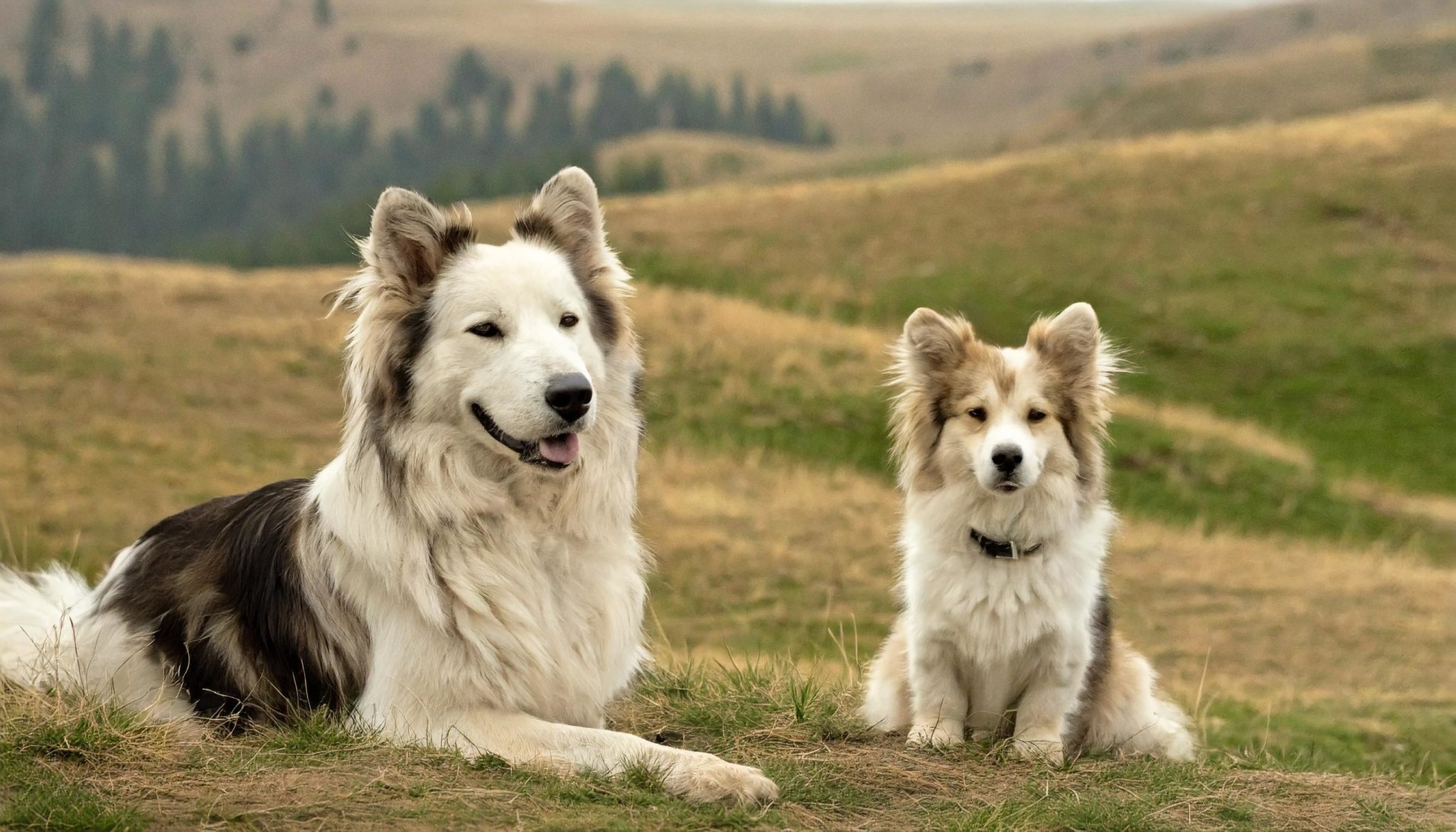
Socialization and education of the Atlas dog
The socialization and upbringing of the Atlas dog, are vital to ensure that this dog develops into a well-adjusted house dog.
Socialization: As the only internationally recognized Moroccan dog breed, the Aidi tends to have a watchful and alert nature. Early socialization is essential to ensure that they interact well with other dogs and people. Exposure to different situations, sounds and environments at an early age helps them become confident and well-adjusted.
Education: The Aidi is naturally active and needs plenty of exercise. Their upbringing should be consistent and patient. Positive reinforcement and rewards work well with this breed, which likes to please their owners. It is important to challenge them mentally and physically to prevent boredom.
How much experience does an Atlas dog require
The level of experience required to raise and care for an Atlas dog, depends on the individual owner and their willingness to be dedicated to this breed.
The Aidi is a medium-sized breed with a very lively nature and a need for plenty of exercise. They have a strong will and can be stubborn, which requires experience with dogs and patience when training and raising them.
It is important to understand that the Aidi is a breed that likes to be in the hands of people with experience, and it takes dedication to fulfill their needs for exercise, socialization and training.
With proper guidance and commitment, both experienced and new dog owners can enjoy the Aidi. It is essential to begin their education at an early age and socialize them well to get an obedient and balanced dog. The best results are achieved by being sensible and providing proper care and attention, such as healthy food and adequate exercise.
Is training necessary for the atlas dog?
Training is definitely necessary with an Atlas dog. Originally from Morocco, this breed is known for its active nature and vigilance. Although they are great dogs, it is essential to train and socialize them properly. By nature, the Aidi is a nomadic herding dog used in hunting and guarding herds.
They need a lot of exercise and have a strong will. Therefore, it is important to begin training at an early age to teach them obedience and how to deal with different situations and people.
With proper training, Aidis can be excellent house dogs, but this requires consistency and patience. They also need adequate exercise to be stimulated both physically and mentally. The best results are achieved by being sensible in approach and using positive reinforcement.
How much exercise does an Atlas dog need?
Because of their origins as sheepdogs and hunting dogs, Atlas dogs need a lot of exercise. They are naturally active dogs and thrive on regular exercise.
Long walks, play and mental stimulation are important to meet their energy needs. Although they are active, Aidis also have a quiet side and can adapt to life in the home, provided they get enough exercise.
How are they getting along with children?
When it comes to dealing with children, the Atlas dog is generally patient and friendly. They can form a strong bond with their family and tend to enjoy being around those they love.
This usually makes them good companions for children. However, as with any breed of dog, it is important to supervise when a dog interacts with children, especially if the dog is not well socialized.

Advantages of an Atlas dog
The Atlas dog, also known as the Aidi, is a unique dog breed with both advantages and disadvantages, depending on your lifestyle and needs.
- Protective: The Atlas dog naturally has a strong guarding nature and can be an excellent watchdog, protecting your home and family from potential threats.
- Loyal: These dogs often develop strong bonds with their owners and are loyal to their families. They can make good companions for those looking for a devoted housemate.
- Strong and active: Aidis are physically powerful dogs that love exercise. They can make excellent partners for active people who enjoy hiking, walking or other outdoor activities.
- Health: In general, Atlas dogs are relatively healthy breeds with few known hereditary diseases.
Disadvantages of an Atlas dog
- Independence: Aidis tend to be independent and can be stubborn. This can make training and socialization more challenging, especially for new dog owners.
- Social Needs: They need early socialization to get along well with other dogs and people. Failure to meet this need can lead to shyness or excessive vigilance.
- Lots of exercise needed: Because of their active nature, Atlas dogs need plenty of exercise. If they do not get enough exercise, they can become destructive.
- Watchfulness: While their watchfulness can be an advantage, it can also lead to excessive barking or distrust of strangers if not properly trained.
How old will an Atlas dog get?
The life expectancy of an Atlas dog, usually ranges between 10 and 12 years, but some specimens can live to be older if properly cared for and kept healthy. As with many other dog breeds, several factors can affect the lifespan of an Atlas dog. Important factors that affect the life expectancy of an Atlas dog include:
- Health: The overall health of the dog plays a crucial role. Regular vet visits, vaccinations, preventive care and a healthy diet can extend the dog’s lifespan.
- Hereditary conditions: Like many other breeds, Aidis can be susceptible to certain hereditary conditions. Breeders who breed selectively and choose healthy parent dogs can reduce the risk of inherited diseases.
- Nutrition and exercise: A balanced diet and adequate exercise are essential to maintaining the health of an Atlas dog and can contribute to a longer life.
- Lifestyle: The dog’s environment and lifestyle play a role. A safe and loving environment, as well as adequate mental stimulation and social contact, contribute to the dog’s well-being.
Price of an Atlas dog
The Aidi Dog is a unique breed that’s uncommon in the US. Pinpointing an exact price range can be tricky due to their rarity. However, it’s estimated that they could potentially cost over $5,000, reflecting their scarce status.
Factors Influencing Price: While there’s no set price for Aidi puppies in the US, several factors typically affect puppy pricing, including:
- Breeder’s reputation
- Pedigree and registration papers
- Geographic location
- The age of the dog, with adults possibly being less expensive than puppies
Finding an Aidi Dog:
- Breeders: Locating a reputable breeder within the US for Aidi Dogs might pose a challenge due to the breed’s rare presence.
- Rescue: Chances are slim for finding an Aidi Dog through US shelters or rescue organizations, given their rarity.
Similar Breeds to Consider:
For those interested in similar breeds more commonly found in the US, here are a few options:
- Anatolian Shepherd Dog: Known for their size, loyalty, and independence as livestock guardians, with prices ranging from $2,000 to $5,000.
- German Shepherd Dog: Highly intelligent and versatile working dogs, typically costing between $1,500 and $3,000.
- Akbash Dog: A rare livestock guardian breed valued for its protective instincts and loyalty, though finding a breeder may be challenging.
Additional Advice:
- Conduct Thorough Research: Large guardian breeds require extensive training, socialization, and experience.
- Adoption Option: Many large breeds find their way into shelters or rescues, offering an opportunity to assess an adult dog’s temperament.
- Ownership Preparation: Commitment to training, exercise, sufficient space, and budgeting for ongoing expenses is essential.
Important Considerations:
- Rarity in the US: Securing an Aidi Dog from a breeder domestically might be exceptionally difficult.
- Alternative Breeds: If an Aidi Dog proves hard to find or unsuitable, consider other available breeds that might better fit your lifestyle.
- Making the Right Choice: Selecting a dog breed that complements your lifestyle and living conditions is crucial. Prioritize compatibility over rarity or aesthetics.




